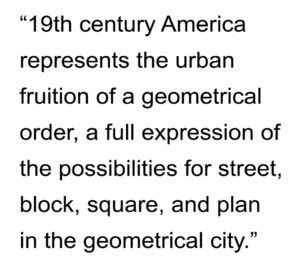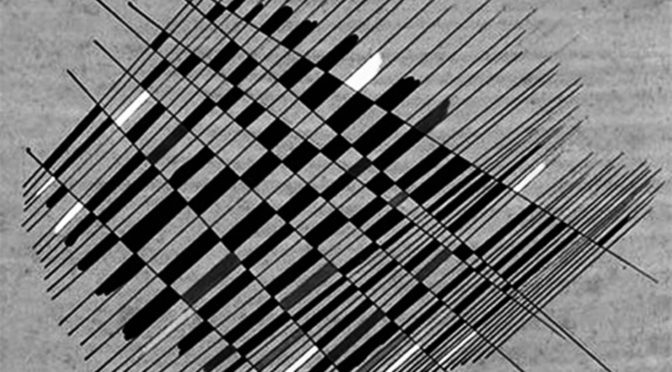On Space | The Geometrical City
by Dr. Mark David Major, AICP, CNU-A
The geometrical city exists in and across time and space, a quantitative and describable pattern finitely persistent in its stability and infinitely malleable in its qualitative flexibility. The spatial geometry of the city flows, never halting and without beginning, it merges together into an intricate network of limitless possibilities and strategic offerings that guide the weary traveler to his destination. It is a tradition rooted in the instinctive nature of our being, stretching back into shadowy mists of the past and striding forward into the enchanted light of a promised future, bounded by the essential truth of living on a tiny sphere floating, awashed at the edges of a universal shore. The geometric city is the hearth of the community, the fertile land gathers around it, providing both sustenance to and sustaining from the urban ideal. At its center lies a sacred space, a place to gather for all, where insider and outsider mingle and exchange freely of their valued time and goods. This is the true Pilgrims’ pride of America, that which can be independently traced to worlds and cultures of Antiquity from east to west, south to north, following the path we emerged from African jungles to cross plains and rivers, the mountains and oceans. The geometrical city is the economy of the community, goods and services are exchanged in space and carried forth into the larger, unfamiliar world.  It welcomes and reassures, it is questions with answers, offering solvable riddles to the observant and the observed.
It welcomes and reassures, it is questions with answers, offering solvable riddles to the observant and the observed.
19th century America represents the urban fruition of a geometrical order, a full expression of the possibilities for street, block, square, and plan in the geometrical city. In the virgin land of this milieu, the geometrical city attains its Renaissance ideal, ultimately a Spanish model of the rational city, relentless in its magnificence as a tapestry, woven by individual hands into a common entity, holistic and worthy of an ancestral past from which it sprouted. Until, at last, radial parts emerge from within or reach forth from center-to-edge to bring a structural wonder to the urban spectacle. The formal and informal, planned and unplanned, coincide in the spatial beauty of the rationally urbane, all shaped within a Jeffersonian framework leaving marks on the landscape to this day. 20th century America demands the ruination of the geometric city in its heedless pursuit of state control and private profit; the faceless bureaucrat and masked capitalist hidden beneath self-serving rubrics, all in the name of an artificial (public and personal) welfare, which taunts the instinctive nature of urban dwelling. Stability is exchanged for unpredictability, the malleable for the rigid, the persistent for the ephemeral, and a natural pattern for the awkwardly contrived forever haunted by an unnatural entropy. It is a doctrine that demands more and more at the expense of less and less (quantity and cost) whilst ignoring the concept of the better and the best (quality). It becomes an irrational anti-city.
On Space is a regular series of philosophical posts from The Outlaw Urbanist. These short articles (usually about 500 words) are in draft form so ideas, suggestions, thoughts and constructive criticism are welcome.

